Diplomatic Bluebook 2024
Chapter 2
Resilient and Unwavering Regional Diplomacy
3 Collaboration with Regional Institutions, and the Asia-Europe Meeting (ASEM)
(1) Cooperation with the North Atlantic Treaty Organization (NATO)
NATO is an organization that aims at providing collective defense for its member countries. In addition to defense for its member countries, it provides engagement in cooperative security efforts with non-EU countries and organizations and in crisis management outside of the region that could pose a direct threat to the security of the territories and peoples of NATO member countries, including security management and counter-terrorism efforts. In response to Russia's aggression against Ukraine, in 2022 Finland and Sweden, which had previously maintained a policy of military non-alignment, applied to join NATO, with Finland joining in April 2023 and Sweden joining in March 2024.
With the existing international order under serious challenge, cooperation between Japan and NATO has become even more important based on the recognition that the security of Euro-Atlantic and Indo-Pacific is inseparable. In January, NATO Secretary General Jens Stoltenberg visited Japan for the first time in six years. In March, in response to the earthquake damage in southeastern Türkiye, Japan dispatched SDF aircraft to transport emergency relief supplies based on the request from the Government of Türkiye and NATO. This was Japan's first international emergency relief operation conducted in cooperation with NATO. In addition, in March, Japan announced a contribution of 30 million U.S. dollars to NATO's CAP Trust Fund for the provision of nonlethal equipment to assist Ukraine in the face of Russia's aggression. Foreign Minister Hayashi attended the Meeting of NATO Ministers of Foreign Affairs in April and Prime Minister Kishida attended the NATO Summit Meeting in July, both for the second consecutive year. Prime Minister Kishida met with NATO Secretary General Stoltenberg during the Summit Meeting, and the two sides announced agreement on a new cooperation document between Japan and NATO, the Individually Tailored Partnership Programme (ITPP) (See the Special Feature on page 142).
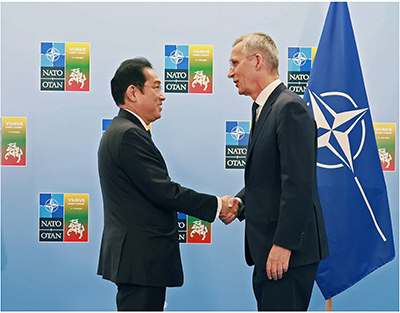 Prime Minister Kishida shakes hands with NATO Secretary General Stoltenberg. (July 12, Brussels, Belgium; Photo: Cabinet Public Affairs Office)
Prime Minister Kishida shakes hands with NATO Secretary General Stoltenberg. (July 12, Brussels, Belgium; Photo: Cabinet Public Affairs Office)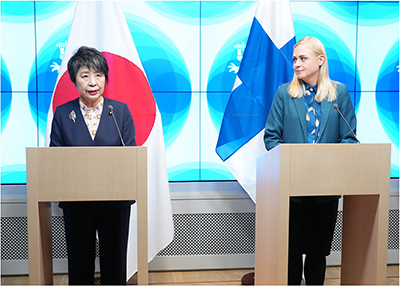 Joint press conference after the Japan-Finland Foreign Ministers' Meeting (January 9, 2024, Helsinki, Finland)
Joint press conference after the Japan-Finland Foreign Ministers' Meeting (January 9, 2024, Helsinki, Finland)2023 was a year of further progress in cooperative relations between Japan and the North Atlantic Treaty Organization (NATO).
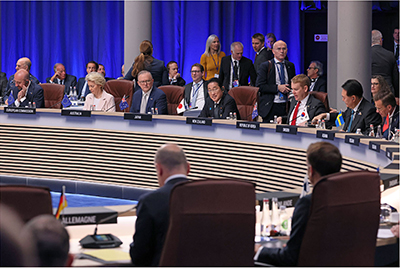 Prime Minister Kishida attending the NATO Summit Partner Session (July 12, Vilnius, Lithuania; Photo: Cabinet Public Affairs Office)
Prime Minister Kishida attending the NATO Summit Partner Session (July 12, Vilnius, Lithuania; Photo: Cabinet Public Affairs Office)In July, Prime Minister Kishida participated in the NATO Summit for the second consecutive year, sending a strong message that the security of Euro-Atlantic and Indo-Pacific is inseparable. At the Summit, he announced the agreement on the Individually Tailored Partnership Programme (ITPP), a new programme for Japan-NATO cooperation.
In order to elevate Japan-NATO cooperation to new heights, the ITPP sets 16 specific fields of cooperation, including cyber, strategic communication, and science and technology, under the four priority issues of (1) emerging security issues, (2) longstanding security issues, (3) expansion of cooperative activities, and (4) promotion of fundamental values.
Based on the ITPP, for example, in the cyber area, the first Japan-NATO Cyber Dialogue was held in November, during which both sides exchanged views on their cyber policies and cooperation in the cyber area. In the same month, the NATO Science for Peace and Security (SPS) Programme “Information Day” was held to promote cooperation between Japan and NATO in science and technology. In addition, practical cooperation continues to be implemented, such as the dispatch of female Japan Self-Defense Forces (JSDF) officers to the NATO headquarters and mutual participation as an observer in various exercises and trainings.
In order to respond to the ever-changing international security environment and to maintain and strengthen the international order based on the rule of law, Japan will steadily strengthen its strategic cooperation with NATO, a partner with which Japan shares fundamental values and strategic interests.
(2) Cooperation with the Organization for Security and Co-operation in Europe (OSCE)
The OSCE is a regional security organization with 57 participating states across Europe, the Central Asia and Caucasus region, and North America, that works to bridge differences between member states and foster trust through conflict prevention, crisis management, and post-conflict recovery and reconstruction in these regions through a comprehensive approach. Japan has cooperated with the OSCE since 1992 as an Asian Partner for Co-operation. Japan provides support to Afghanistan and Central Asian countries to strengthen border controls to prevent terrorism and strengthen the capabilities of customs officials, to strengthen the leadership capacity of women in conflicts in Ukraine and neighboring countries, and to strengthen the capacity to prevent human trafficking. Furthermore, the OSCE has been playing an important role in improving the situation in Ukraine even before Russia's aggression began in 2022. Japan has been providing financial support and dispatching experts to the OSCE Special Monitoring Mission (SMM) (experts were dispatched intermittently since August 2015, and dispatches ended in February 2022).
Japan has been attending the OSCE Ministerial Council meetings every year. Parliamentary Vice-Minister for Foreign Affairs Fukazawa participated in the meeting held in December in North Macedonia. At the meeting, he stated that Japan will further strengthen cooperation with the OSCE, which is addressing issues with a comprehensive approach.
(3) Cooperation with the Council of Europe (CoE)
The CoE is an international organization comprising 46 member states in Europe, which has played a key role in establishing international standards in areas concerning democracy, human rights, and the rule of law. As the CoE's sole observer country in Asia since 1996, Japan has contributed to the CoE by providing expertise and supporting the holding of meetings.
At the 4th CoE Summit held in May, Prime Minister Kishida issued a message in which he noted that Japan has deepened its cooperative relations with the CoE, which shares fundamental values and principles. He also welcomed the establishment of an organization to register the damage caused by Russia's aggression against Ukraine and stated that Japan will actively participate in future discussions.
(4) Cooperation through the Asia-Europe Meeting (ASEM)
ASEM was established in 1996 as the sole forum for deepening dialogue and cooperation between Asia and Europe. Its members currently comprise 51 countries and two institutions. It works through summit meetings, ministerial meetings including foreign ministers' meetings, seminars, and other activities focused on three pillars, namely (1) politics, (2) economy, and (3) society and culture.
The Asia-Europe Foundation (ASEF) is ASEM's only permanent institution. It is located in Singapore and is responsible for activities in the field of society and culture, one of the three pillars.
Japan has supported the ASEF with its project stockpiling medical personal protective equipment (PPE) and antiviral drugs to combat infectious diseases, and cooperated in the emergency transportation of stockpiled supplies to ASEM partners and the implementation of capacity building workshops for emergency response and public health network projects. As part of these efforts, Japan and the ASEF jointly held a high-level conference on “Universal Health Coverage (UHC) in an Era of Antimicrobial Resistance (AMR) and Pandemics” in Tokyo in February. In addition, in June, “Pandemic and the Economy 2023: A Pandemic-Resilient Society” was held in Finland. Under the ASEF's Project for Strengthening Preparedness and Response to COVID-19 and other Emerging Infectious Diseases, financially contributed to by Japan, drugs, PPE, medical devices and other items to combat infectious diseases were provided through the World Health Organization (WHO) to Ukraine and its neighboring countries accepting Ukrainian displaced persons (ASEM partners: Poland, Romania, Hungary, Slovakia, Czech Republic, and Bulgaria; non-ASEM partner: Moldova).
In addition, Japan contributed to ASEM's activities including through the implementation of ASEF Classroom Network online projects as a co-host, and its financial contributions to the ASEF.

Other European Regions
Nordic countries
Iceland: In November, Foreign Minister Kamikawa participated in the Reykjavik Global Forum 2023 hosted by Women Political Leaders (WPL),5 the Government of Iceland, and the Parliament of Iceland via video message.
- 5 WPL is an international network of women politicians and an organization working to increase the number and influence of women political leaders. It was founded in 2013 by former European Parliament Vice President Silvana Koch-Mehrin. Foreign Minister Kamikawa has been a WPL Ambassador since 2016.
Sweden: In April, Foreign Minister Hayashi held an informal talk with Foreign Minister Tobias Billström during the Meeting of NATO Ministers of Foreign Affairs in Belgium, and in May, he visited Sweden to attend the EU Indo-Pacific Ministerial Forum co-hosted by the EU and Sweden, where he also met with Foreign Minister Billström. In addition, in June, Foreign Minister Hayashi held a meeting with Minister for Defense Pål Jonson, who was visiting Japan. In July, Prime Minister Kishida, who was visiting Lithuania to attend the NATO Summit Meeting, held his first summit meeting with Prime Minister Ulf Kristersson, during which they concurred to further strengthen bilateral security cooperation. In January 2024, Foreign Minister Kamikawa visited Sweden and held a Japan-Sweden Foreign Ministers' Meeting.
Denmark: In October, Prime Minister Kishida held his first summit meeting with Prime Minister Mette Frederiksen, who was visiting Japan. The two leaders issued the Joint Leaders' Statement on the Deepening of the Strategic Partnership between Japan and the Kingdom of Denmark as well as the Joint Strategic Work Program.
Norway: In December, Prime Minister Kishida held his first summit meeting with Prime Minister Jonas Gahr Støre, who was visiting Japan, and the two leaders issued the Joint Statement on the Strategic Partnership between the Government of Japan and the Government of the Kingdom of Norway.
Finland: In April, Finland joined NATO during the Meeting of NATO Ministers of Foreign Affairs held in Belgium. In May, Foreign Minister Hayashi visited Sweden to attend the EU Indo-Pacific Ministerial Meeting co-hosted by the EU and Sweden, and held a meeting with Foreign Minister Pekka Haavisto. In August, the Japan-Finland Working Holiday Agreement entered into force. In January 2024, Foreign Minister Kamikawa visited Finland and held a Japan-Finland Foreign Ministers' Meeting.
Benelux countries
The Netherlands: In February, Foreign Minister Hayashi held a meeting with Deputy Prime Minister and Minister of Foreign Affairs Wopke Hoekstra during the emergency special session of the UN General Assembly held in New York. Furthermore, in September, Prime Minister Kishida held his first summit meeting with Prime Minister Mark Rutte during the G20 Summit in New Delhi, in which the two leaders confirmed the strengthening of cooperation in fields including security. In October, the Japan-Netherlands Peace Exchange Programme was held. In January 2024, Foreign Minister Kamikawa visited the Netherlands, paid a courtesy call to Prime Minister Rutte, and held a Japan-Netherlands Foreign Ministers' Meeting.
Belgium: In April, Foreign Minister Hayashi visited Belgium to attend the Meeting of NATO Ministers of Foreign Affairs and held a meeting with Foreign Minister Hadja Lahbib. In addition, in July, Prime Minister Kishida visited Belgium to attend the Japan-EU Summit Meeting. He held his first summit meeting with Prime Minister Alexander De Croo, during which he confirmed that the two countries will closely cooperate to strengthen bilateral relations and address various international issues.
Luxembourg: In April, Foreign Minister Hayashi held a foreign ministers' meeting with Minister for Foreign Affairs and Europe Jean Asselborn during the Meeting of NATO Ministers of Foreign Affairs in Belgium.
Baltic countries
Estonia: In February, Foreign Minister Hayashi held a foreign ministers' meeting with Foreign Minister Urmas Reinsalu during the Munich Security Conference held in Germany.
Latvia: In February, Foreign Minister Hayashi held a meeting with Foreign Minister Edgars Rinkēvičs during his visit to Germany to attend the Munich Security Conference. In May, Foreign Minister Hayashi held a meeting with Foreign Minister Rinkēvičs during his visit to Sweden to attend the EU Indo-Pacific Ministerial Forum co-hosted by the EU and Sweden. In August, the Japan-Latvia Working Holiday Agreement entered into force.
Lithuania: In February, Foreign Minister Hayashi held a meeting with Foreign Minister Gabrielius Landsbergis during his visit to Germany to attend the Munich Security Conference. In May, Foreign Minister Hayashi held a meeting with Foreign Minister Landsbergis when he visited Japan to attend the Munich Leaders Meeting. In July, Prime Minister Kishida visited Lithuania to attend the NATO Summit Meeting and held meetings with Prime Minister Ingrida Šimonytė and President Gitanas Nausėda. In addition, during this time, Prime Minister Kishida held an informal talk with the prime ministers of Estonia, Latvia, and Lithuania, in which the leaders concurred to strengthen cooperation between Japan and the three Baltic countries.
Ireland: In June, Foreign Minister Hayashi met with Deputy Prime Minister and Minister for Foreign Affairs and Defence Micheál Martin during the Ukraine Reconstruction Conference held in the UK.
Andorra: In May, a cabinet shuffle took place and Foreign Minister Imma Tor Faus remained in office. In November, Parliamentary Vice-Minister for Foreign Affairs Fukazawa paid a courtesy call to Foreign Minister Faus during the OSCE Ministerial Council meeting.
San Marino: As heads of state of San Marino, Captains Regent Alessandro Scarano and Adele Tonnini took office in April, followed by Captains Regent Filippo Tamagnini and Gaetano Troina in October.
The Vatican: In January, during his visit to Italy, Prime Minister Kishida offered condolences and flowers for the death of His Holiness Pope Emeritus Benedict XVI at the end of December 2022.
Portugal: In April, Foreign Minister Hayashi held a meeting with Foreign Minister João Gomes Cravinho during the Meeting of NATO Ministers of Foreign Affairs in Belgium. In September, Foreign Minister Kamikawa met with Foreign Minister Cravinho during the UN General Assembly in New York.
Malta: In February, Foreign Minister Hayashi met with Minister for Foreign and European Affairs and Trade Ian Borg during the emergency special session on Ukraine of the UN General Assembly in New York. In October, Malta held the third national security advisors' meeting on Ukraine, which was attended by National Security Advisor Akiba. On January 1, 2024, the Embassy of Japan in Malta was opened, which is expected to create an environment for building even closer relations and promoting cooperation between Japan and Malta (See the Column on page 150).
Monaco: In August, a delegation of Diet members led by Member of the House of Representatives and Diet Affairs Committee Chairman TAKAGI Tsuyoshi visited Monaco and paid a courtesy call to Minister of State Pierre Dartout.
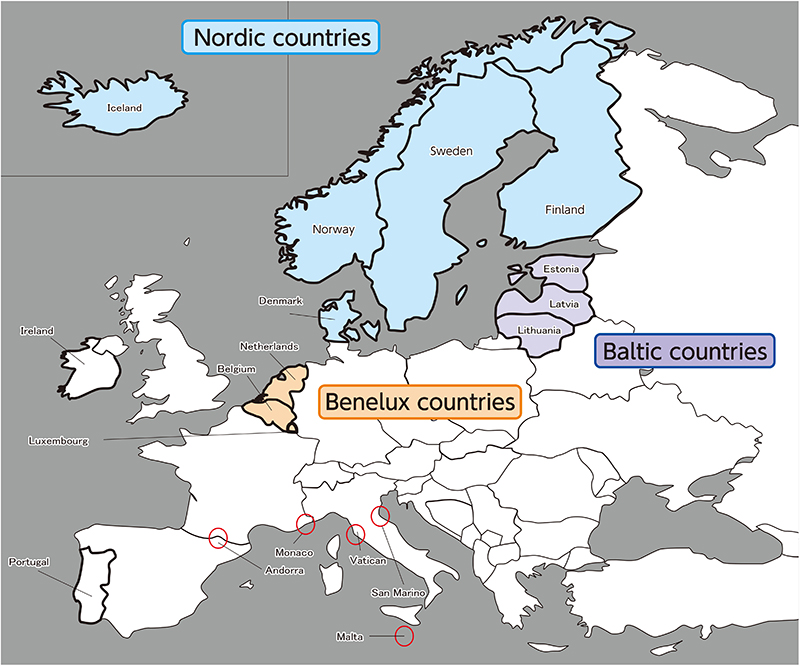
【V4】
Bilateral relations between Japan and the V4 countries of Slovakia, the Czech Republic, Poland, and Hungary have a long history and are traditionally friendly. Cooperation with the V4, which are neighboring countries of Ukraine and share fundamental values and principles such as freedom, democracy, rule of law, and human rights, is important. The 12th “V4+Japan” policy dialogue was held in March, where the countries reaffirmed strengthening cooperation in a wide range of fields.
Slovakia (V4 chair until June): The 30th anniversary of the establishment of Japan-Slovakia diplomatic relations was marked by increased exchanges at various levels, including the foreign ministers' meeting between Foreign Minister Hayashi and Minister of Foreign and European Affairs Rastislav Káčer in New York in February, and the meeting between State Minister for Foreign Affairs YAMADA Kenji and State Secretary of the Ministry of Foreign and European Affairs Ingrid Brocková, who visited Japan in May.
Czech Republic (V4 chair from July): In July, Prime Minister Kishida held a summit meeting with President Petr Pavel in Lithuania, and the leaders concurred to promote cooperation not only in regional affairs but also in the economic security field. In addition, a delegation of Chamber of Deputies diplomatic members (April), Deputy Prime Minister for Digitisation Ivan Bartoš (June), Deputy Prime Minister and Minister of Health Vlastimil Válek (October), and Committee on Foreign Affairs, Defence and Security of the Senate Chairperson Pavel Fischer (October) visited Japan, strengthening intergovernmental and legislative ties in the 30th anniversary of the establishment of Japan-Czech Republic diplomatic relations.
Poland: See 2 (7) Poland
Hungary: In February, Foreign Minister Hayashi held a foreign ministers' meeting with Minister of Foreign Affairs and Trade Péter Szijjártó in New York. In July, Minister of Foreign Affairs and Trade Szijjártó visited Japan and held a foreign ministers' meeting with Foreign Minister Hayashi.
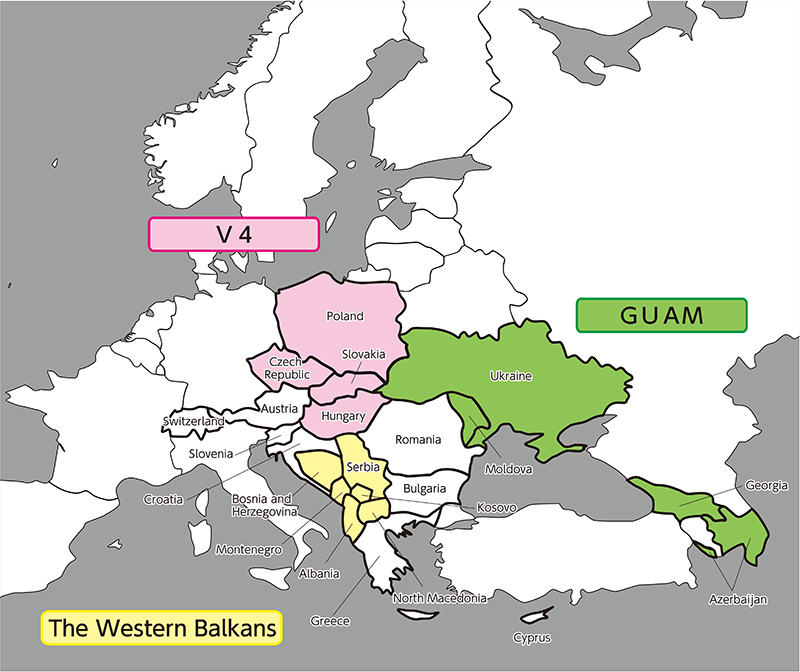
The Western Balkans
In the Western Balkans region, despite ongoing concerns about peace implementation and ethnic conflicts, including the intensification of separatist actions by the Republika Srpska, one of the two entities that make up Bosnia and Herzegovina, and the stalled dialogue aimed at normalizing relations between Serbia and Kosovo, countries in the region have made overall progress toward stability and development as they undertake reforms aimed at joining the EU. As part of the “Western Balkans Cooperation Initiative,”6 in November, as a collaborative project with the Western Balkan Fund established by the governments of the Western Balkans, Japan held an inter-regional conference on the theme of responding to disinformation with participants from each West Balkan country. Moreover, youth exchange was held under the theme of peacebuilding as a cooperation project with the Western Balkans Regional Youth Cooperation Office (RYCO).
Active high-level dialogue was also realized under the same initiative. In February, Prime Minister Kishida met with Prime Minister Edi Rama of Albania during his visit to Japan. The two leaders concurred on the importance of addressing Russia's aggression against Ukraine and the need to respond to any unilateral attempts to change the status quo by force or coercion in the East and South China Seas, and shared serious concerns over North Korea's increasing nuclear and missile activities. They also concurred to further strengthen cooperation in the international arena, including the UN, taking into account that both Japan and Albania are non-permanent members of the UN Security Council. In addition, in December, Parliamentary Vice-Minister for Foreign Affairs Fukazawa, during his visit to North Macedonia to attend the OSCE Ministerial Council meeting, held a meeting with Foreign Minister Bujar Osmani.
- 6 In January 2018, Prime Minister Abe became the first Japanese prime minister to visit Serbia, where he announced the “Western Balkans Cooperation Initiative” to advance cooperation with the Western Balkan countries (Albania, North Macedonia, Kosovo, Serbia, Bosnia and Herzegovina, and Montenegro) on their path to join the EU, and promoted cooperation with the entire Western Balkan region in areas such as youth exchanges and economic exchanges.
Slovenia: In September, Foreign Minister Kamikawa held a meeting with Deputy Prime Minister and Minister of Foreign and European Affairs Tanja Fajon during her visit to the U.S. to attend the UN General Assembly High-Level Week.
Romania: In March, Prime Minister Kishida met with President Klaus-Werner Iohannis and Foreign Minister Hayashi met with Foreign Minister Bogdan Aurescu during their visit to Japan, upgrading Japan-Romania bilateral relations to a strategic partnership (See the Column on page 148). In June, Parliamentary Vice-Minister for Foreign Affairs YOSHIKAWA Yuumi visited Romania and attended the opening ceremony of the Braila Bridge, which was constructed with Japanese technology. In September, Prime Minister Kishida participated via video message in the Three Seas Summit held in Bucharest. In October, State Minister for Foreign Affairs Tsuji visited Romania and paid courtesy calls to Presidential Advisor Bogdan Lucian Aurescu and Foreign Minister Luminita Odobescu.
Bulgaria: In April, Foreign Minister Hayashi held a meeting with Foreign Minister Nikolay Milkov in Belgium.
Croatia: In celebration of the 30th anniversary of the establishment of Japan-Croatia diplomatic relations in 2023, Foreign Minister Hayashi met with Minister of Foreign and European Affairs Gordan Grlić-Radman in New York in February and in Tokyo in July. During the foreign ministers' meeting in July, the Japan-Croatia Air Services Agreement was signed. In addition, Parliamentary Vice-Minister for Foreign Affairs Yoshikawa visited Croatia in July, and State Minister for Foreign Affairs Tsuji visited Croatia in October.
Austria: In May, an agreement in principle was reached for the Agreement between Japan and the Republic of Austria on Social Security, which had been the subject of intergovernmental negotiations. Foreign Minister Hayashi also held a foreign ministers' meeting with Minister for European and International Affairs Alexander Schallenberg in the same month. In addition, in November, the 25th meeting of the Japan-Austria Committee for Issues of the Future was held in Kofu City, Yamanashi Prefecture, on the theme of efforts toward a decarbonized society in both countries.
Liechtenstein: In June, Foreign Minister Hayashi held a foreign ministers' meeting in the UK with Minister of Foreign Affairs, Education and Sport Dominique Hasler, the first-ever Japan-Liechtenstein Foreign Ministers' Meeting since the establishment of diplomatic relations in 1996.
Switzerland: In July, the governments of Japan and Switzerland held the fifth meeting of the Joint Committee and the third meeting of the Sub-Committee on Rules of Origin, Customs Procedures and Trade Facilitation established under the Free Trade and Economic Partnership Agreement (FTEPA) between Japan and Switzerland. In November, there was an announcement of the logo commemorating the 160th anniversary of the establishment of diplomatic relations between Japan and Switzerland in 2024.
Greece: In January, Prime Minister Kishida held a summit meeting with Prime Minister Kyriakos Mitsotakis, who was on an official working visit to Japan. The two leaders issued the Joint Statement on Strategic Partnership between the Government of Japan and the Government of the Hellenic Republic. In November, the Tax Convention between Japan and the Hellenic Republic was signed.
Cyprus: In May, Foreign Minister Hayashi held a meeting with Foreign Minister Constantinos Kombos during the EU Indo-Pacific Ministerial Forum, jointly held by the EU and Sweden, in Stockholm.
Moldova: Japan maintained close relations with Moldova, which is in a difficult situation due to Russia's aggression. In February, Foreign Minister Hayashi held a telephone call with Deputy Prime Minister and Minister of Foreign Affairs and European Integration Nicu Popescu. In October, Foreign Minister Kamikawa participated via video message in the 4th Ministerial Conference of the Moldova Support Platform held in Chișinău, the capital of Moldova, expressing continued support for Moldova as it is affected by Russia's aggression against Ukraine.
●Romania: A Latin Country in Eastern Europe
Romania is located in southeastern Europe, with a land area roughly the size of Japan's Honshu Island and a population of about 19.05 million, the sixth largest among the 27 countries of the European Union (EU). With Romanian roots in the indigenous Dacians and Romans, the country is also known as the “Latin island in the Slavic sea.” Since joining the EU in 2007, Romania's economy has been steadily growing, achieving 4.8% growth in 2022 against the backdrop of 10.69 billion euros in foreign investment, the highest amount ever. Romania is also a friendly country to Japan in Eastern Europe with the second largest number of Japanese language learners after Poland.
Romania borders Ukraine, and its government and citizens have taken the initiative in assisting many displaced persons since Russia's aggression against Ukraine launched. Romania's support for Ukraine is reminiscent of its support for Japan at the time of the Great East Japan Earthquake, when it accepted students from Fukushima University and held an exhibition of paintings by children from Fukushima.
●History of Japan-Romania Exchanges
 Logo for the 100th anniversary of the establishment of diplomatic relations between Japan and Romania
Logo for the 100th anniversary of the establishment of diplomatic relations between Japan and Romania Commemorative coin issued by Romania's central bank to mark the 100th anniversary of the establishment of diplomatic relations (one side features a Japanese design and the other has a Romanian design)
Commemorative coin issued by Romania's central bank to mark the 100th anniversary of the establishment of diplomatic relations (one side features a Japanese design and the other has a Romanian design)Japan-Romania relations date back to the establishment of Romania's legation in Tokyo in 1921. Diplomatic relations were severed in 1944 but resumed in 1959. Prime Minister Abe became the first Japanese Prime Minister to visit Romania in 2018, and the 100th anniversary of the establishment of diplomatic relations between Japan and Romania was celebrated in 2021. While struggling with the impact of the COVID-19 pandemic, Japan widely introduced Japanese culture to Romania, such as through online performances of Awa Ningyo Joruri puppet theater and participating in “Bookfest,” Romania's largest book festival. In addition, Romania issued a commemorative coin from its central bank, and the Radu Stanca National Theater Sibiu held a performance in Japan. Through such festive events, bilateral exchanges were further deepened.
●Signing of the Joint Statement on the Establishment of the Strategic Partnership
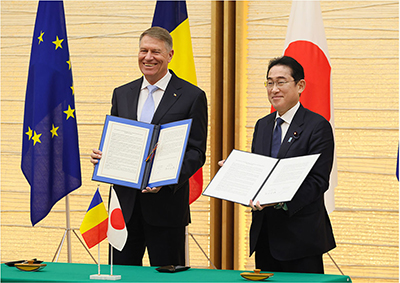 Prime Minister Kishida and President Iohannis signing the Joint Statement on the Establishment of the Strategic Partnership between Japan and Romania (March 7, Tokyo; Photo: Cabinet Public Affairs Office)
Prime Minister Kishida and President Iohannis signing the Joint Statement on the Establishment of the Strategic Partnership between Japan and Romania (March 7, Tokyo; Photo: Cabinet Public Affairs Office)In March 2023, President Klaus-Werner Iohannis visited Japan and signed the “Joint Statement on the Establishment of the Strategic Partnership between Japan and Romania” with Prime Minister Kishida, upgrading bilateral relations to a strategic partnership.
In light of this, in the areas of diplomacy and security, Parliamentary Vice-Minister for Foreign Affairs YOSHIKAWA Yuumi (July), Parliamentary Vice-Minister of Defense ONODA Kimi (August), and Parliamentary Vice-Minister for Foreign Affairs TSUJI Kiyoto (October) visited Romania in succession. In July, a defense attaché was assigned to the Embassy of Japan in Romania for the first time in 22 years.
On the economic front, in May, Minister of Economy, Trade and Industry NISHIMURA Yasutoshi became the first Japanese Minister of Economy, Trade and Industry to visit Romania, and signed the “Joint Statement on economic cooperation.” In June, the “Romanian-Japanese Innovation Forum” was held with themes including start-ups, 5G, and smart cities. In July, a ceremony was held to mark the completion of the Braila Bridge, the third longest suspension bridge in the EU, over the Danube River. Built with Japanese technology, the Braila Bridge is a successful example of project cooperation in line with the “Partnership on Sustainable Connectivity and Quality Infrastructure between Japan and the European Union.”
In terms of culture, various events were held, including the “Hanami” cherry blossom viewing event in the Japanese Garden in Bucharest (April); the “I Love Sushi” exhibition (May-June); various cooperation activities with the Sibiu International Theater Festival, one of the three major theater festivals in Europe (June); the Japan festival at the Comic Con in Bucharest, the largest pop culture convention in Eastern Europe (September); the Japanese Film Festival in Timișoara, which was selected as one of the 2023 European Capitals of Culture (November); and the Tenjin Matsuri performance at the National Theatre of Bucharest (November).
Japan will continue to further deepen Japan-Romania relations, which have made great strides through the strategic partnership.
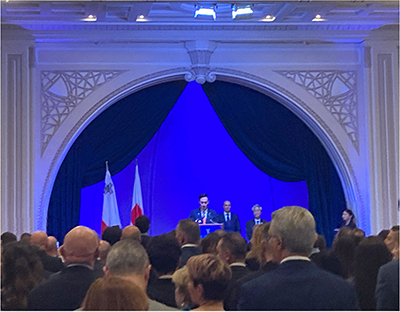 The opening ceremony held to commemorate the establishment of the Embassy of Japan in Malta (February 26, 2024, Malta)
The opening ceremony held to commemorate the establishment of the Embassy of Japan in Malta (February 26, 2024, Malta)Malta is located in the center of the Mediterranean Sea. It was occupied by Napoleon's forces at the end of the 18th century and became a British territory in the early 19th century, but gained independence in 1964 and established diplomatic relations with Japan the following year in 1965. Malta is familiar to those in the know as Japan's largest source for imported bluefin tuna. The Embassy of Japan in Malta was established in January 2024. With this establishment, Japan now has diplomatic bases in all 27 member states of the European Union (EU).
Japan-Malta exchanges have been strengthened since Prime Minister Abe became the first Japanese Prime Minister to visit Malta in 2017. Prime Minister Joseph Muscat visited Japan in 2018, and President George Vella attended the Ceremony of the Enthronement of His Majesty the Emperor in 2019. The Embassy of Malta in Japan opened in 2020, and Minister for Foreign and European Affairs and Trade Ian Borg visited Japan to attend the state funeral for the late Prime Minister ABE Shinzo. In this way, bilateral exchanges have rapidly increased in recent years.
Malta is an important maritime state that leads the world in maritime issues, and is committed to ensuring peace and security in the Mediterranean Sea. Its importance has been particularly growing in recent years for Japan, which is working to realize a “Free and Open Indo-Pacific (FOIP)” based on the rule of law. In addition, Malta has been serving with Japan as a non-permanent member of the United Nations (UN) Security Council from 2023 to 2024. At the Japan-Malta Foreign Ministers' Meeting held in February 2023 in New York, the United States, the two foreign ministers concurred to further strengthen cooperation between the two countries as partners who share values and principles.
By establishing a diplomatic base in Malta, which is becoming increasingly important as described above, and by holding constant exchanges of views with stakeholders there in various fields, the Ministry of Foreign Affairs will promote understanding on Japan in Malta as well as discussions on further bilateral cooperation going forward.
Furthermore, Valletta, Malta's capital city, which was built in the 16th century and is entirely registered as a World Cultural Heritage Site, is a popular tourist destination. The number of Japanese tourists visiting the city surged from 8,500 to 22,000 between 2015 and 2019 before the spread of COVID-19. With English and Maltese being the official languages of Malta, the number of Japanese students studying English in the country has also increased rapidly, reaching approximately 3,000 by 2022. Thus, there is dramatically increasing need for consular services for Japanese residents and tourists in Malta.
Until now, consular services had been provided by officials of the Embassy of Japan in Italy to Japanese residents in Malta who regularly traveled to Malta, but in urgent cases, consular services could only be received by visiting the Embassy in Italy. With the opening of the Embassy of Japan in Malta, consular services are now available at the Embassy there. In addition, Japanese residents in Malta will be able to receive assistance more quickly in the event of an incident or accident in Malta.
Moreover, Japan expects that public relations, cultural exchanges, and other such activities in Malta will be more active than before, with the Embassy of Japan in Malta as their hub. In light of the 60th anniversary of the establishment of diplomatic relations between Japan and Malta in 2025, the opening of this embassy will yield the greatest effect of public relations and promotion of understanding on Japan through the deepening of cooperation with local cultural organizations and the continuous implementation of programs that introduce Japanese culture and promotion of Japanese language education.
Japan looks forward to further deepening Japan-Malta cooperation in a variety of fields, with the Embassy of Japan in Malta as the hub.



